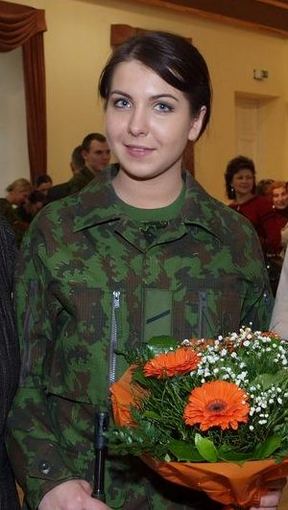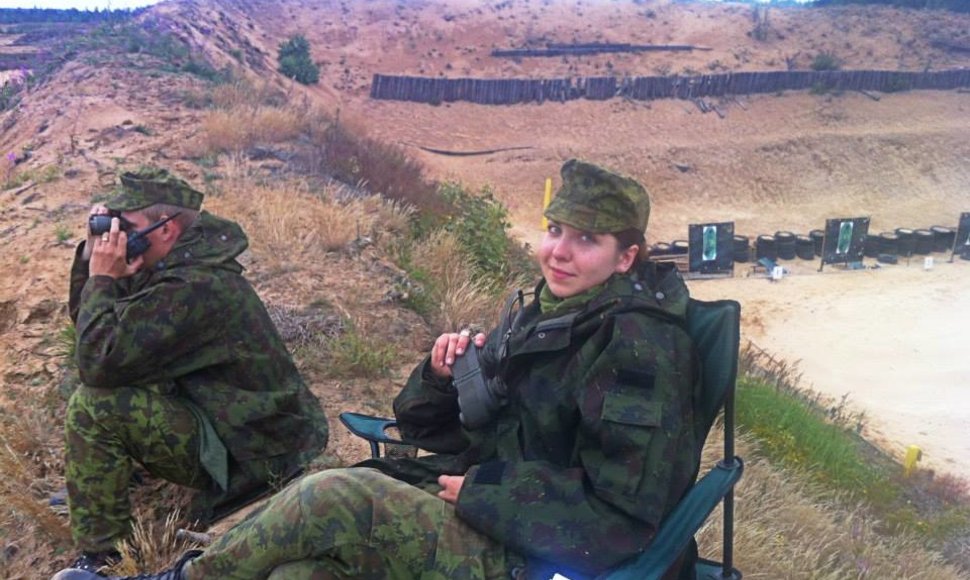Justina, who is a fourth-year law student at Mykolas Romeris University, decided to try out what it was like to be a soldier two years ago. Even though she had always been interested in things military and even considered applying to the Military Academy after school, she ended up studying law, because, she says, it seemed a “more feminine” choice.
“Even though my mother herself works in the national defence system, she tried to talk me out of studying in the Military Academy. When you join the army and put on a uniform, you're equal with everyone else. There are no distinctions – male or female. You do everything others do without exceptions and considerations for gender,” says the student.
So even though she did not opt for full-time studies at the Military Academy, Justina later learned about the Junior Commander Training (JCT).
 |
| Asmeninio archyvo nuotr./Justina Stirbavičiūtė |
“In order to qualify for the training, you must have an academic degree or be a university student. However, it is open only to people under 32 and those who can present a doctor's letter that they are physically healthy. After finishing the three-year Junior Commander Training course, you get a rank of reserve lieutenant. I am also studying law. You can meet people of all trades here – chemists, physicists,” Justina says.
A day in military academy
Pupils of the Military Academy are allowed very little discretion, they need to get permissions for most activities. Every day is organized on a strict schedule. Early in the morning, students gather, line up, and the entire company goes to breakfast. After the meal, they go to a field for morning inspection, sing the national anthem, honour the flag.
“We have a beautiful tradition. Every morning, the JCT section commander, Captain Blinstrubas, announces who has a birthday on that day. The 'culprits' have to come to the captain, they get a handshake and a word of congratulations. Everyone applauds,” the student relates.
After the flag ceremony, students head to classes. They are instructed on weaponry, tactics, medicine, and other military sciences. After that, lunch, more classes and practical training, dinner, and compulsory sports. Justina says that the course is very challenging – it involves a lot of reading, studying maps, war engineering, tactical manoeuvres, statutes, etc.
“After sports, it is meal time. Everyone is looking forward to it. It is the only window when you can relax, because the rest of the time, you must always be watchful of your surroundings. You're tense and on alert all the time, always in action. No free time at all, no independence. You have to tell someone about your every move,” Justina says.
According to her, getting used to such a disciplined schedule was not easy, but now she cannot imagine herself living any other way.
You're tense and on alert all the time, always in action. No free time at all, no independence. You have to tell someone about your every move.
Competition among women
Except for some lower physical requirements, servicewomen get no concessions while serving alongside their male colleagues – they have to go on guard, obey orders, carry equally heavy bags, wear the same uniforms, carry and take care of their firearms.
Justina says that competition between men and women in the Military Academy is fierce – women want to be as good as men, while men do not want to be outdone by women.
“One time, the girls did better in physical screening than the guys. So the guys started doing more sports in order to outdo us in the following testing,” she says.
Physical exercises are not the only field of competition between the sexes.
“Many believe that men are more interested in guns than women. However, the girls at the Military Academy take as much interest in guns as the men. We often play games where we compete who is going to dismantle and reassemble a rifle faster, who will clean it first. There's competition all the time.”
Justina admits, though, that she feels more rivalry from fellow servicewomen than from men: “We are quite few, so everyone wants to do better than the rest. The girls are trying harder than guys to be faster, stronger, get better marks. We chose this, so we do not want to be treated any less seriously.”
War games in Pabradė
This year, Justina and other would-be reserve lieutenants participated in a two-week military exercise in Pabradė. After arriving at the polygon, Justina's squad was not even given any time to build tents, where they were supposed to live throughout the training, and sent right away on a topographical mission.
“We went one by one. We had to locate specific spots in the forest. That day, it was the first time I had ever held a compass and a map in my hands. I was all alone in the forest – I stood there with a rifle, in the company of no one but trees and birds. I had to figure out what the map meant and how to use the compass. It started raining, got very scary. After some time, I realized I had walked five kilometres in a wrong direction. My feet were sore, I was all wet, it was pouring, my shoes completely soaked. I knew, however, that I had to pull it through,” Justina recalls her initial challenges.
So she gathered all her energy, walked back the five kilometres, found the starting point and continued the mission from the beginning.
During the first week of the exercise, Justina was assigned to be a machine-gunner. All the women in her squad, she recalls, were given this role.
“When you're a machine-gunner, you must be ready to open fire at any moment. It would make sense to have a male soldier take charge of the machine gun or the projector. But it was the other way round. All girls were made machine-gunners,” Justina says.
Back in the city, it was weird to see pavement, the surface seemed too firm, land too level. People so colourful. We had spent so much time seeing nothing but hues of green, black, and brown.
For her personally, the most memorable part of the exercise was digging trenches. “We spent four days in the forest,” she recalls. “I had to dig up trenches for the machine-gunner and the machine-gunner's assistant. After this exercise, I realized why grave diggers' fees were so high. Because it takes four or five hours to dig a trench up to your armpits. It is really tough. The gravel keeps filling up what you've dug. On the first day, we had to dig up the trench and then fill it up with earth again. The next day, same all over again.”
She says that trenches must be in specified dimensions and properly disguised, in order to prevent the enemy from spotting them. The corridors must be wide and long.
In addition to that, the exercise included going on a watch, organizing ambushes, building stations in the forest, laying down obstacle courses with barbed wire, throw grenades, fire from bazookas, machine-guns. Soldiers also had to rescue the injured, provide emergency medical help, do tactical manoeuvres, disguises, etc. Squads were attacking, retreating, then hammering one another. It felt like a real war, Justina recalls.
Psychological strain
According to Justina, most fellow soldiers in Pabradė experienced a breakdown on the third or fourth day of the exercise. They felt cold, exhausted, irritable due to sleep deprivation. But after the critical period passed, they got used to everything and even started enjoying the war game.
“I decided that, having endured so much already, there was no sense in giving up. I realized I was getting so much more than I was losing. For me, the exercise was a proof that I had made a right choice. The second week went by like one day. I did not want to leave the polygon. Back in the city, it was weird to see pavement, the surface seemed too firm, land too level. People so colourful. We had spent so much time seeing nothing but hues of green, black, and brown. For two weeks, we had been dirty, our hands always soiled from constant digging or carrying something. Two weeks of sleeping in tents. There had been no time even to wash ourselves,” Justina says.
She feels her time in the Military Academy made her stronger physically and psychologically. The young woman has learned to better interact with people and listen to them – not just lead, but also take orders.
“I will continue on this path. My law degree is good in the sense that even the army needs lawyers. And I want to work here. I adore uniforms, I adore complete equality among people. Everyone looks orderly, smart. Once you put on a uniform, you're obliged to act differently than a civilian,” the would-be reserve lieutenant shares her future plans.
 |
| Alfredo Pliadžio nuotr./Kariūnų priesaikos akimirka |


















